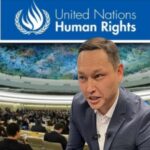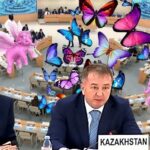June 2012
It is five years since the EU adopted its Strategy for a New Partnership with
The EU Central Asia Strategy, which was endorsed by the EU governments in June 2007, provides a framework for increased cooperation between the EU and
However, five years on, there is broad consensus that the human rights dialogues established with the Central Asian governments and other measures taken to implement the Strategy’s human rights objectives have not been as effective as desired. The overall human rights situation in
We, the undersigned organizations, welcome and support efforts by the EU to strengthen and enhance its engagement on human rights in the framework of its Central Asia Strategy. We join in making the recommendations below for how we believe the EU should go about its human rights policies in
· The EU should pursue a coherent approach to strengthening respect for human rights in
· The EU should be consistent in addressing human rights in its relations with the Central Asian governments and stay true to its values at all times, not allowing other interests in the fields of energy and security to serve as an excuse for downplaying or ignoring human rights on any occasion. By expressing human rights concerns in some cases, while downplaying them in others, the EU risks delivering the message to the Central Asian governments that it is ready to trade its values when the circumstances so require. This will undermine the credibility and impact of its human rights policies. Official representatives of EU member states should also refrain from expressing views that contradict and undermine common EU human rights positions.
· The EU should raise human rights issues visibly and prominently in its relations with the Central Asian governments and more frequently take a public stand on human rights issues in the region. While quiet diplomacy may work best in some situations, a higher degree of overall visibility will help in enhancing the profile and integrity of the EU as a human rights actor (including in the eyes of the Central Asian public) and help show that it is serious about human rights. The recent use of local delegation statements is a positive practice, which should be further encouraged, though should not become a substitute for statements issued at the highest level from
· The EU should be more transparent about its human rights policies in
· As part of its implementation of country strategies for human rights in Central Asia, the EU should adopt and elaborate specific objectives for human rights change for each of the states in this region, drawing on recommendations made by civil society, the European Parliament, international human rights review bodies and other relevant actors when doing so. It should promote implementation of the objectives in a sustained and public manner and use conditionality to this end, thereby ensuring that the level and nature of its continued engagement with the Central Asian governments depends on measurable human rights progress, as emphasized by the European Parliament[7].
· The EU should insist on concrete and measurable human rights change in the Central Asian countries and not be satisfied with window-dressing, i.e. measures that are taken by the governments of the region to create an impression of human rights progress but that do not result in any meaningful positive change in practice (e.g. the adoption of legislation, action plans or programs that are not adequately or effectively implemented). Regular and thorough evaluation of human rights improvements in the countries of the region is of key importance in this regard.
· The EU should reinforce and improve the impact of the human rights dialogues it conducts with the governments of the region, among others, by adopting and publicising clearly defined objectives and priorities for the dialogues; involving civil society more closely in the dialogues (see more below); informing all relevant stakeholders about the discussions and outcomes of the dialogues; and ensuring that there is a systematic follow-up on the dialogues. The EU should also regularly assess the achievements of the dialogues in relation to their objectives, in line with the EU Guidelines on Human Rights Dialogues,[8] which call for the EU to measure progress against objectives set before the start of the dialogues with a view to ensuring the added value of the dialogues. The EU should consider on this basis whether to reorient a dialogue if there is evidence it is not achieving added value, or even becoming an end in itself.
· The EU should, as a matter of practice, hold comprehensive preparatory meetings with both international NGOs and independent local groups (including exile groups where relevant) prior to its human rights dialogues with the Central Asian governments; integrate civil society concerns and recommendations more prominently into the dialogues; and invite civil society to participate in assessing the outcomes of the dialogues.
The EU Civil Society seminars held in
· The EU should also do more to proactively engage with independent human rights activists from
· The EU should continue to provide financial assistance to human rights projects implemented by independent civil society groups in
· The EU should coordinate and streamline its engagement on human rights in
· The EU and its member states should ensure that all EU-based companies that operate in the Central Asian countries, as well as foreign-based companies that are involved in trade between the EU and Central Asian countries are committed to upholding human rights values and anti-corruption practices in their business dealings in the region, e.g. by aligning their operations with the OECD Guidelines on Multinational Enterprises[10] and the UN Guiding Principles on Business and Human Rights[11]. Moreover, in order to promote transparency and accountability, the EU should also require that oil, gas and mining companies with which it and its member states cooperate in Central Asia disclose the payments made to governments in the region on a country-by-country and project-by-project basis in their annual financial accounts, as called for by the Publish What You Pay civil society coalition[12].
Signatories
International Partnership for Human Rights (
The
Turkmen Initiative for Human Rights (
Initiative Group of Independent Human Rights Defenders of
Human Rights Watch
Norwegian
Legal Policy Research Centre (
Feminist League (
International Legal Initiative (
Adil Soz International Foundation for Protection of Freedom of Speech (
MediaNet (
Almaty Helsinki Committee (
Fenix Centre of Development and Adaptation (
Human Rights
Human Rights Society of
Association internationale de défense des droits de l’homme «Club des Cœurs ardents» (
Mulberry Media (
LIGLIS-CENTER for Political Studies (
Youth Human Rights Group (
Voice of Freedom Foundation (“Golos Svobody”) (
Nota Bene Public Foundation (
Avesto (
Lawyers’ Association Pamira (
Association of Parents of Disabled Children (
Bar Association of
National Association of Independent Mass-Media in
Independent Centre for the Protection of Human Rights (
Association of Invalids in
Human Rights Centre (
Equal Opportunities (
Society and Law (
Law and Prosperity (
Moscow Helsinki Group
Ukrainian
Promo Lex Association (
Association of Ukrainian Monitors on Human Rights Conduct in Law Enforcement (
Human Rights Monitoring Institute (
Georgian Young Lawyers’ Association
Belarusian Human Rights House in
Crude Accountability (
Human Rights Centre of
Freedom Files (
Article 19 (United Kingdom)
[1] The EU and
[2] For an overview of current human rights problems in Kazakhstan, Turkmenistan and Uzbekistan, please see the separate document The EU Central Asia Strategy and Human Rights Protection: Civil Society Views and Recommendations issued by International Partnership for Human Rights, the Netherlands Helsinki Committee, Kazakhstan International Bureau for Human Rights and Rule of Law, Turkmen Initiative for Human Rights, and Initiative Group of Independent Human Rights Defenders of Uzbekistan. It is available at www.iphronline.org
[3] Joint Progress Report by the Council and the European Commission to the European Council on the implementation of the EU Central Asia Strategy. Available at: http://register.consilium.europa.eu/pdf/en/10/st11/st11402.en10.pdf#page=2
[4] Article 21 of the Treaty of the European Union, at http://eur-lex.europa.eu/LexUriServ/LexUriServ.do?uri=OJ:C:2008:115:0013:0045:EN:PDF
[5] “Increasing the Impact of EU Development Policy: An Agenda for Change”, COM (2011) 637 final, October 2011, http://ec.europa.eu/europeaid/what/development-policies/documents/agenda_for_change_en.pdf
[6] Par. 12 of European Parliament resolution of 15 December 2011 on the state of implementation of the EU Strategy for
[7] Par. 3 of the resolution cited in previous endnote.
[8] The EU Guidelines on Human Rights Dialogues state that the assessment of human rights dialogues “will involve assessing the [human rights] situation [in a given country] in relation to the objectives which the
[9] The EU Guidelines on Human Rights Defenders are available at: http://www.consilium.europa.eu/uedocs/cmsUpload/GuidelinesDefenders.pdf
[10] The last updated version of the Guidelines was endorsed by 42 OECD and non-OECD countries in May 2011, http://www.oecd.org/dataoecd/43/29/48004323.pdf
[11] These Guiding Principles were adopted by the UN Human Rights Council on 16 June 2011. Section II of them concerns “The corporate responsibility to protect human rights.” See http://www.business-humanrights.org/media/documents/ruggie/ruggie-guiding-principles-21-mar-2011.pdf
[12] This is a global coalition, with over 650 member organizations, campaigning for transparency in the payment, receipt and management of revenues from the oil, gas and mining industries. For more information, see http://www.publishwhatyoupay.org/about
















